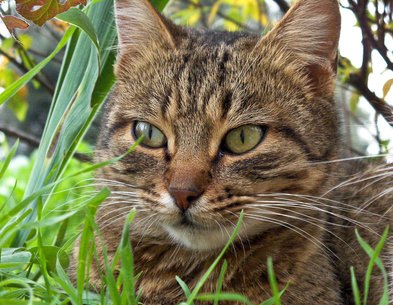
English ivy is poisonous to cats. English ivy is also very attractive to a feline that is craving greens to help eliminate fur balls or ease indigestion. For a household with cats, English ivy is not a safe indoor or outdoor plant variety.
Identification
English ivy is also known as branching, glacier, needlepoint, sweetheart and California ivy. All varieties contain Triterpenoid saponins (hederagenin), the toxic principle that not only poisons cats, but also dogs and horses, according to the ASPCA. English ivy foliage, the part most attractive to cats, is more poisonous than the berries.
Effects
A cat that has ingested an English ivy plant salivates excessively, vomits and suffers from diarrhea. The feline also shows signs of abdominal pain and sensitivity. In severe cases of toxicity, the cat's organs might fail.
Prevention/Solution
Emergency veterinary medical attention is crucial to saving a cat that is ill from eating English ivy. Prevention is the better alternative, however. If English ivy is a must for the home or garden, make sure the cat cannot access it. Check the plant regularly, particularly the leaves, for signs of the cat eating it. If the cat becomes ill, take it to the vet immediately, or contact the ASPCA's National Animal Poison Control Center at 888-426-4435. As of 2010, the ASPCA charges of $65 per case.

English ivy is poisonous to cats. English ivy is also very attractive to a feline that is craving greens to help eliminate fur balls or ease indigestion. For a household with cats, English ivy is not a safe indoor or outdoor plant variety.
Identification
English ivy is also known as branching, glacier, needlepoint, sweetheart and California ivy. All varieties contain Triterpenoid saponins (hederagenin), the toxic principle that not only poisons cats, but also dogs and horses, according to the ASPCA. English ivy foliage, the part most attractive to cats, is more poisonous than the berries.
Effects
A cat that has ingested an English ivy plant salivates excessively, vomits and suffers from diarrhea. The feline also shows signs of abdominal pain and sensitivity. In severe cases of toxicity, the cat's organs might fail.
Prevention/Solution
Emergency veterinary medical attention is crucial to saving a cat that is ill from eating English ivy. Prevention is the better alternative, however. If English ivy is a must for the home or garden, make sure the cat cannot access it. Check the plant regularly, particularly the leaves, for signs of the cat eating it. If the cat becomes ill, take it to the vet immediately, or contact the ASPCA's National Animal Poison Control Center at 888-426-4435. As of 2010, the ASPCA charges of $65 per case.
No comments:
Post a Comment